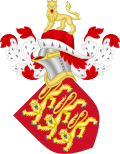Quia Emptores is a statute passed by the Parliament of England in 1290 during the reign of Edward I that prevented tenants from alienating their lands...
47 KB (6,920 words) - 02:28, 26 January 2025
enactments, in 1279 (Statutum de Viris Religiosis, 7 Edw. 1) and 1290 (Quia Emptores, 18 Edw. 1), passed in the reign of Edward I of England, aimed at preserving...
23 KB (3,543 words) - 12:00, 24 October 2024
be subdivided. This has been prohibited since 1290 by the statute of Quia Emptores that prevents tenants from alienating their lands to others by subinfeudation...
34 KB (4,317 words) - 23:48, 10 February 2025
increase of such subtenures. Accordingly, in 1290 a statute was passed, Quia Emptores, which allowed the tenant to alienate whenever he pleased, but the person...
3 KB (325 words) - 12:56, 29 October 2024
process known as sub-enfeoffing or "subinfeudation". The 1290 Statute of Quia Emptores abolished subinfeudation and instead allowed the sale of fee simple...
11 KB (1,701 words) - 15:05, 5 June 2024
including serjeanty, frankalmoin and knight-service. The English statute Quia Emptores of Edward I (1290) established that socage tenure which passed from...
3 KB (375 words) - 17:20, 30 May 2024
from him, but who was himself the vassal of a higher lord. Owing to Quia Emptores, the concept of a mesne lordship technically still exists today: the...
6 KB (714 words) - 21:44, 31 December 2024
Every seignory now existing must have been created before the statute Quia Emptores (1290), which forbade the future creation of estates in fee-simple by...
3 KB (369 words) - 20:07, 22 October 2024
Odellsrett – Scandinavian family land laws Property tax in the United States Quia Emptores – English statute of 1290 Serfdom – Status of peasants under feudalism...
7 KB (1,004 words) - 09:44, 14 June 2024
Statute of Westminster II, contained the clause De donis conditionalibus Quia Emptores of 1290, often called the Statute of Westminster III, prevented tenants...
898 bytes (154 words) - 13:27, 15 March 2019





